Coworkation at the Coworking Europe Conference 2015
Only English text.
This is a re-post of Samantha Wolf’s original post here.
Milan, Italy. Photo: Julianne Becker
Milan, Italy. “Coworking and Vacation is becoming a trend topic in a growing number of summer and winter spots” — the title of a talk held on the first day of the 2015 Coworking Europe Conference by Steve Munroe from Hubud sounded promising.
Back in 2014: a long, long time ago…
Last year when I went to my first Coworking Conference in Lisbon with the vague idea of writing something about Coworking and Tourism, all there was in this area were two Unconference sessions — one of which I hosted myself.
There was a handful of people interested in the topic — most of them planning to open a Coworking Space somewhere where people usually go on holiday, the bigger share of them expats in said holiday destination themselves.
The hazy language I am using here is no accident: terms like Workation or Coworkation might well have existed back then but they certainly weren’t used. The session I hosted 2014 in Lisbon was humbly called “Coworking and Tourism”.
Most people’s reaction to this title and my idea was something along the lines of “what on earth does Coworking have to do with tourism?”. If I managed to explain, that I thought tourism destinations and rural areas could profit from a “new type of tourist” attracted by Coworking Spaces and that, vice versa, Coworking Spaces could profit from existing tourism in the areas they are located in, many people were skeptical.
Either they thought this was such an incredibly niche thing that it wasn’t even worth thinking about or they simply thought it was a terrible idea for Coworking Spaces to target tourists. The latter group’s main concern being that short-term guests wouldn’t add anything to the community and could therefore potentially threaten the all important community feeling built and nurtured over time.
Welcome to 2015: the beginning of a new era?
A lot has changed since. This year in Milan, the Session I hosted together with Julianne from Coconat — who, in the meantime, had progressed from being interested in opening a “space for people that want to relax and get some work done” to actually having it open — was called “Workation/Coworkation/ Startup Retreats/Co-living”.
Certainly not the catchiest title. However, it captures the state of the phenomenon quite well. Last years paraphrases and explanations around “Coworking and Tourism” have been replaced by a series of buzzwords lowering the word count whilst extending the footnotes: What is the difference between Co-living and Co-housing? Does Coworkation need Co-living? Is Workation an accurate term for location independent professionals that simply work from wherever they want? Are they offended about the “vacation” part of Coworkation? When does a Workation deserve the prefix Co?
Take-away 1: We need to find a common language.
If nothing else, the variety of terms and words trying to capture the observed phenomenon and the often passionate dispute around them is probably a healthy sign for a growing trend. The fact that these terms are being reflected on might mean that they are becoming more relevant. Finding suitable words and developing a common language seems to be the desire of many people involved in this mostly very constructive discourse.
Steve’s post a few days after the Conference summarises this nicely:
“Last week in Milan I had the opportunity to speak to over 400 people about the changing nature of work and learning as more people opt to use the world as their classroom and office. The main point was the term ‘co-workation’ is an inaccurately narrow summation of the truly global shift that is happening (…).”
Steve Munroe, founder of Hubud in Bali. Photo: Heather Bonker
The Presentation
No surprise then, that Steve didn’t quite stick to the title on the program. He simply named his talk “Working in Paradise” and thereby made for an auspicious kick-off of the topic of Coworking and Vacation at this years Conference.
Hubud, the “Hub-in-Ubud”, is probably the most famous exotic Coworking Space in the world. Along with it’s natural beauty, the low costs of living and the favorable climate, the community at Hubud has become one of the reasons why many creatives, techies and entrepreneurs based in less exotic regions of this world dream of relocating to Bali.
Steve introduced us to the Hubud archetype: A person between the age of 31 and 45, staying at Hubud for 1–6 months:
By comparing the living costs in London to those on Bali, he then explains one of the main reasons why more and more people able to work location independently come to Bali — or to any other of the current “digital nomad hot-spots”. Taking the costs for rent, food, transport, internet and phone calls into account the savings of living in Ubud instead of London amount to a respectable $24’000 per year.
With an ever growing number of freelancers, more and more of the biggest talents becoming self-employed and many of the most innovative companies offering flexible and location independent employment models there is no way of arguing with Steve’s statement:
“Our work is changing”
So if you can work from wherever in the world you want, then why not go to Bali or Spain or Eastern Europe or wherever else you fancy. Move to where you like the temperatures, the nature, the people or the city and probably manage to save quite some money. A growing number of location independent knowledge workers is doing just that, right now. Steve concludes:
“The Migration to everywhere is underway”
The Panel
In the afternoon of Day 1, Steve’s fulminate start into the topic was followed by a Panel discussion. Under the heading “Coworkation, mobile working, nomadism: a new open door for coworking? an illustrious circle discussed whether and how Coworking Spaces are making the most of this “Migration to everywhere”.
Take-away 2: With a talk and a panel on the official Conference program, it looks as if the intersections of tourism and Coworking are steadily making their way onto the Coworking agenda.
The concepts presented at the panel seem as different as the participants representing them:
First up is a familiar face: Julianne from Coconat — a workation retreat in the middle of nowhere in rural Brandenburg. A few years ago already, Julianne and her co-founders have spotted the Berliner’s need to sometimes get out of the city, have a deep breath, find some new inspiration and redefine their work-life-balance. Their Space surrounded by forests, lakes and rivers offers digital creatives, freelancers and entrepreneurs a break from the fast paced city life without having to completely stop working on what they are passionate about. Something people coming to Coconat really appreciate is the convenience, Julianne says:
“People that come to Coconat don’t have to worry about cooking and cleaning.”
However, Coconat doesn’t only want to serve Berlin’s urban start-up-crowd:
“We didn’t want to be an alien in the local community. We want to lower the digital gap of countryside and city — workation and rural development can go hand in hand…”
Julianne Becker, Co-Founder Coconat. Photo: Stephano Borghi.
Julianne remarks. It seems that the Brandenburg tourism and development authorities have a similar view on this. It is a very promising sign that the people from the Brandenburg tourism board have already got in touch with Coconat and even invited them to a convention.
In the person of Stuart there is a new interesting face featured in the panel discussion. The Bali based Australian is the man behind Coworkation.com. His plan is to organise a series of temporary Pop-up Coworking Spaces. In the process of launching Coworkation.com he is currently doing a lot of Coworkation himself and finds:
“Coworkation is kind of a fusion of work and hostel travelling — two things that we used to keep separate.”
He believes that Coworkation bears the potential to bring passionate and driven people with a lot of skill into regions where there might be a lack of such. According to Stuart, whether or not local authorities see and reward this depends a lot on the government. In Asia, he adds, because of legal reasons one has to be careful with the topic of people “working” there.
Eric is two concepts related to Coworking and travelling in one: Copass and Mutinerie Village. Copass is best described in their own words: “500+ unique workspaces. One pass. Access the largest network of coworking spaces with one pass”. It offers monthly memberships that let people work from any workspace in their extensive network — worldwide. In this sense, as Eric says:
“Coworkation is the logical continuation of Coworking”.
Photo: Mutinerie Village
For a while already, Copass has been well known for being a great resource to find suitable work-space wherever you are and whatever your current needs might be. According to Eric:
“Copass is especially useful for people that want to have an extended weekend. If they are able to find a good place to work from easily, they might be able to take a cheaper flight on Thursday and stay a bit longer in a city”.
On top of that, being in a local Coworking Space offers the chance to connect with people from the area and provides a different view on the place.
However, Eric too isn’t satisfied with the term Workation. In lack of a better word he states:
“It’s just work from anywhere.”
Tying in with Steve’s presentation he comes to a very interesting conclusion about the “workation phenomenon” and its potentials: Digital nomads, able to stay 6 months or even years wherever they want, are an extreme case. However:
“the number of people on earth that can combine work and vacation away from home and their usual place of work for 2–3 weeks per year is enormous!”
Moving away from Copass to Mutinerie Village, the permanent Coworking Space in rural France Eric co-founded together with his two brothers and a friend, it is the question of whether there is any support for the project from regional tourism or commerce departments: “We were welcomed warmly by local authorities”, Eric says,
“because Mutinerie Village inverts an unloved trend; it helps to stop people from leaving the countryside and even brings people from the city to the rural area.”
He adds: “Thanks to Mutinerie Village and its community, you can escape the density of the city without the side effect of isolation rural areas are often associated with”.
Take-away 3: “Coworkation Spaces” should try to work with local authorities and communities — they can help making rural areas more attractive for a generation traditionally drawn to the city.
Last but not least, a quite different angle is provided by Anita. Coming from a family traditionally in the hotel business, she is part of the team behind the first Coworking Hotel in the heart of Vienna. Hotel Schani opened in March this year and aims to connect local coworkers working long-term in the Coworking Space in the hotel’s lobby with travelling coworkers staying for a few days only. As for now, the trendy hotel is still in it’s early stages and Anita remarks:
“We are only at the beginning of the community building”
Working closely with the Frauenhofer Institute researching the needs of the future hotel guest, Hotel Schani aims to be a “smart hotel” where you are instantly set-up and ready to do whatever you came for. Hotel Schani’s target group are city travelers, staying for a few days only. They are coming for conferences or business meetings and appreciate the option of having a desk and a meeting room and the opportunity to connect with people.
Hotel Schani, Anita tells us, is receiving “traditional support” from tourism departments — nothing financial though. She notes:
“There isn’t much awareness for this topic yet.”
Hotel Schani. Photo: Kurt Hoerbst
Take-away 4: Some regional authorities have noticed the opportunities Coworking can hold for local tourism and regional development. However, awareness still seems low and highly selective.
The Session
The second day of the Coworking Europe Conference is traditionally the Unconference day. This means anyone can propose a topic that will be discussed at a certain time in one of the available session zones — anyone can join any session.
Session planning at the Coworking Europe Conference 2015. Photo: from original post.
The main goal of our session “Workation/Coworkation/Startup Retreats/Co-living” was to gather everyone involved and interested in the topic together, to listen, learn and connect.
The idea behind it was simply to feel the pulse: find out how many of us there were, what kind of ideas were floating around and what could be expected to happen in the near future.
This goal was certainly achieved. Attendance was high and interest strong. Some of the most relevant things we found out in course of the session and the subsequent networking are:
- Plans are put in practice: Last years planners were this years makers. Many of the people that attended the “Coworking and Tourism” Session a year earlier now have their very own “Coworkation” Space; among them Coconat, Rayaworx and Hotel Schani. Additionally, there is a respectable amount of new places that were not on last year’s radar: Sun and Co. and bed n desk for example.
- The list is growing: The list of spaces, places, retreats, camps and concepts combining work and vacation or work and travelling with some form of Coworking concept is growing steadily. According to Julianne, who has been trying to keep the overview and connect all the operators, there are currently about 90 projects in this area worldwide. It is safe to say, that there will be more. Plans for new “Coworkation” Spaces are being forged in Barcelona, Puerto Rico, Sardinia, Serbia and Transylvania — just to name a few.
- The mood has changed: Critical voices, skeptical of mixing long-term Coworkers and short-term guests have gone more quiet. Mixing travelers and locals through a Coworking space is increasingly seen as beneficial for everyone involved.
- There are going to be some “extensions”: Consequently, many operators have started thinking about the potentials of extending their “traditional” Coworking Spaces by some form of “coworkation” element. Among the attendees of this years session there were, for example, proprietors with Spaces in Barcelona, Tuscany and Sicily that are considering making more out of being located in popular travel destinations. What these “extensions” will actually look like remains to be seen. There are many conceivable options: offering “in-house” co-living, providing package deals with hotels or apartment rentals, simply targeting tourists more directly, etc.
Extending their concept with some element of coworkation can also be an interesting option for long-term co-housing projects. Inspired by the session, Fiona from Halton Mill, a co-living and Coworking Space in the rural North of England, said she loved the idea and would look into possible concepts. She could, for instance, imagine existing “co-livers” subletting rooms to “coworkationists”. - Operators are ready to cooperate with each other: The mood is good and the outlook positive. Operators and proprietors seem eager to try and test things and they are ready to connect, support each other, share knowledge and ideas and learn from each other. The dominant feeling at the Conference was one of collaboration and community — just like it should be. A strong community of “Coworkation Space” owners seems to be in the making. This is a good start, because, as Eric mentions in the panel discussion.
“Knowledge sharing and visibility will be crucial”.
At the moment we are using the momentum and are building the community — and we are looking forward to a Copass “unlimited coworkation/co-living pass.”
—–
Notes:
At the time of posting, Samantha is still collecting data for her research paper, you can help out by filling in the survey here.
If you have a project that involves working and tourism (or travelling), please join our discussion and network with us here.
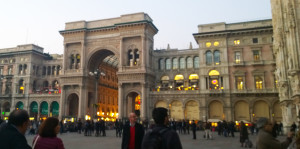

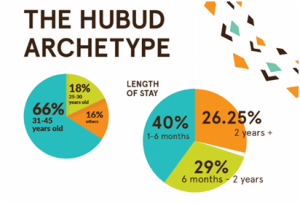
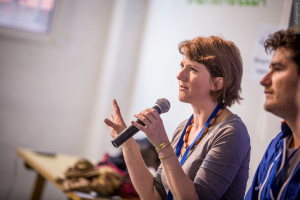
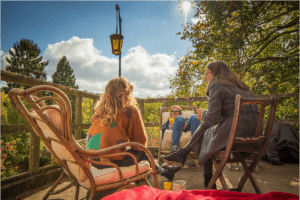
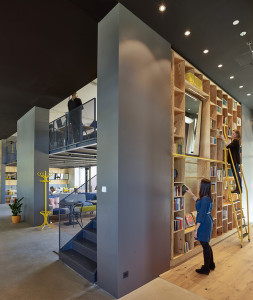
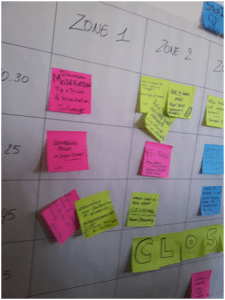

 Share on Facebook
Share on Facebook Share on Twitter
Share on Twitter